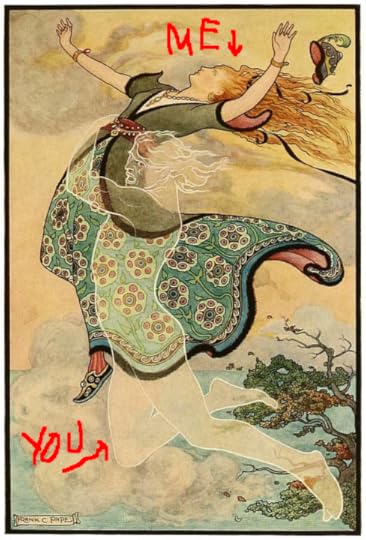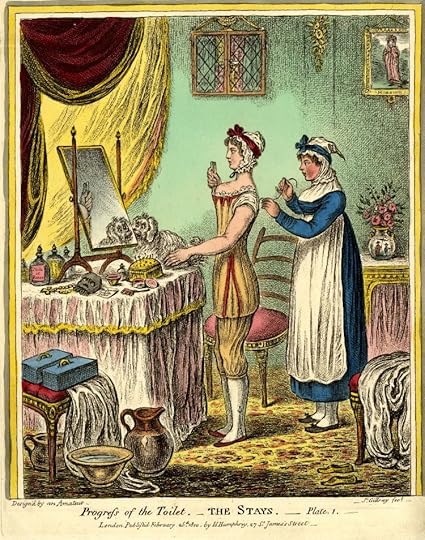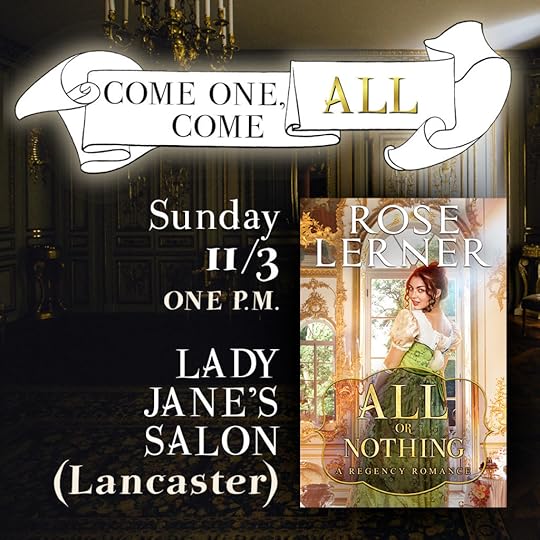Rose Lerner's Blog, page 2
March 25, 2020
Teespring is sprung!
February 24, 2020
IN FOR A PENNY is just 199 pennies!
My debut, In for a Penny, turned 10 this week! To celebrate, I put the book on sale for just $1.99 at all retailers.
Amazon and Apple have already dropped the price, and the others should follow in the next day or two.
Follow the celebration on Twitter (where I’ll be playing the Rom Com Game on Tuesday) and Patreon (where I’ll be taking prompts for flashfiction on Wednesday)!
February 18, 2020
Protected: Longwood Gardens
This content is password protected. To view it please enter your password below:
Password:
February 7, 2020
Upcoming romance event + 10 year pubiversary celebration!

Philly Loves Romance presents:
ROMANCING THE LIBRARY
Sunday, February 15 | 12-4PM | Parkway Central Library lobby | 1901 Vine St., Philadelphia

Join local romance authors (including me!!) in the lobby of the Parkway Central Library for a day of Valentine’s fun! A dozen local authors will be selling and signing their romance novels. There will be snacks, drinks, and a craft station where all ages can make valentines to your local library branch, your favorite book, or that special someone you forgot to give one to the day before. Chat with romance authors, discover new books to love, and go on a Blind Date with a Book.
Full details here on the Free Library website.
I won’t be bringing all my books, so if there’s one you know you want, just hit reply and tell me! I will also be bringing all the kids’ Valentines cards I’ve accumulated over the years–Harry Potter, WWE, and Star Wars (“Join the Resistance, Valentine”). I can sign one to you, or you can take one to give a friend!

Feb. 23 is the 10 year anniversary of In for a Penny‘s release–in other words, my 10 year publiversary! Since the Wednesday after is Ash Wednesday, I figured I’d celebrate by writing flashfiction for my Patreon patrons…
This is open to ALL patrons, even if you only give $1 a month!
(For those of you who haven’t done a flashfiction day with me before, basically, in the comments of the 2/26 Spoiler Wednesday post, you can give me a prompt related to any of the characters or to the world of any of my books, and I’ll write you at least 100 words of fiction in response. Almost anything goes, so start brainstorming now!
I promise to do at least the first 10 prompts I receive–if there’s something you really want, maybe set a Google reminder? The post will go up on 2/26/2020 at 12PM Philadelphia time.
I’m still slowly reorganizing all the extras on my site, so be patient with me if you have to scroll through comments because anchor links are broken, but you can find all the mini-stories from previous flashfiction days here.)
If you aren’t already a patron, you can join here!
I’ll also be playing the Rom-Com Game on Twitter that Tuesday (2/25), so keep an eye out!!
Just to get corny for a second: thanks for all your support in the years since my debut. You are the wind beneath my wings.
(That has been my in-joke with myself for years and I can’t even remember what it’s a reference to? I think maybe the Buffy episode where she and Spike think they’re going to get married??…MWAHAHAHA YES I WAS RIGHT
…but also you are. For realsies.)

(Image credit: Illustration from “The Russian Story Book” by Richard Wilson, illustrated by Frank C. Papé, 1916. Via Wikimedia Commons.
Other Wikimedia Commons images I considered to illustrate you being the wind beneath my wings:
“A Flight Through Space: The Fairy Tales of Science” (You owe it to yourself to look at this frankly)Hans Christian Andersen illustration of a baby riding a swallow“A Flight of Fairies” by Robert Anning Bell)
Here’s to our next ten years together!
January 16, 2020
Being a servant in the Regency was a truly terrible job
Note: this is a reprint of a post which originally appeared on AllAboutRomance.com.
[trigger warning: discussion of sexual harassment/assault]
Happy new year, all!
Being a servant is not a great job. I knew that when I set out to research Listen to the Moon
(my new Regency romance about an impassive valet and a snarky maid who
marry to get a plum job), and most of what I read just made it seem
worse and worse.
Part of why Longbourn (Jo Baker’s Pride and Prejudice retelling from the servants’ point of view) didn’t quite work for me (I DNF’ed a few chapters in) was the constant detailing of servants’ misery. Their hands are dry! They work long hours! They have to empty chamber pots! It felt like there wasn’t anything else in their brains or lives. Of course it’s true that servants’ hands are dry and they work long hours and have to empty chamber pots—but. I don’t know. People with crappy jobs still tell jokes and have emotional lives? Being poor really, really sucks but it doesn’t mean it’s all you think about and that you are 100% miserable 24/7? People are not defined solely by their tragedies?
It’s complicated, but I just feel like, there is a lot of that story out there. The Dickensian “those poor wretched people!” story. I would rather read and write a different kind of story, where bad stuff happens and also people live and laugh and gossip and have work drama and love each other and are sometimes deliriously happy.
That’s why I’m a romance writer, I guess.
So since I didn’t do it in my book, this is my place to really get in
there and wallow in what a truly crappy job being a servant was.
I remember as a little kid asking my mom about women’s rights after watching Mary Poppins. She told me that back when many married women didn’t work or have their own bank accounts, they were dependent on their husbands. So you had to hope that your husband was nice, because if he was it could be okay, but if he was mean, there wasn’t a lot you could do about it.
Being a servant was a lot like that. If you had a nice boss, it could
be okay. If you didn’t, you were completely screwed. Highlights:
1. The hours. Servants were expected to work from
early in the morning to late at night. There was no part of the day that
was designated as free time or after work. If their boss needed
something in the middle of the night, they’d be woken up.
If I had a nickel for every time I have read a complaint about maids
reading novels when they should be working, I would be rich! But when
CAN they read novels, then? They are working ALL THE TIME.
They were rarely allowed to have guests, even in the kitchen, so for
many servants their only opportunity for a social life outside the home
was on their time off, which was a half-day once a week at best and
sometimes not even that. (Plus Sunday morning for church in some
households.)
Many servants in this time period were maids-of-all-work, meaning
they were the only servants a family had. I can’t imagine how lonely
that must have been.
2. Employers felt entitled to dictate everything about their servants’ lives.
Many female servants were not allowed to date (though of course making a
rule is not always the same as being able to enforce it). And they were
watched obsessively for any signs of a love life or, God forbid,
pregnancy.
Some employers also didn’t even like servants leaving the house! For example, in 1821 John Skinner wrote that he “made
it a rule…to state [to new servants] my dislike of them going into the
village,” though he did say he would allow them to “go home to their
friends, or occasionally see them here”.
Bridget Hill writes in Servants: English Domestics in the Eighteenth Century (a really great resource) that “So
great was the desire of some masters to keep their servants at home
that they locked them in when they went out. So when Mr. Goodwin, the
minister at Tankersley, went to church, he locked his maid and two
children in the house.”
Remember that Regency locks usually worked differently than modern
ones: they were key-and-keyhole locks, where you could lock them, put
the key in your pocket, and walk away, and the door would be locked from
both sides. No fire codes here!
3. Which leads to…no privacy. Outside of country
estates with dedicated servants’ quarters or wings (and I don’t think
they were entirely universal at country houses, even, in this time
period), servants could not count on having a bed, let alone a room to
themselves. They might sleep in closets, on landings, or even on the
kitchen floor. Their rooms didn’t always have doors. And as Hill notes, “wherever their quarters were, something that was common to them all was that they could rarely be locked.” If there was a key, housekeepers or employers kept it, not the servants themselves.
4. The above quote from Hill is from a chapter titled “The Sexual Vulnerability and Sexuality of Female Domestic Servants.”
I feel like I don’t even really need to say more. Servants who were
harassed or assaulted had very little recourse and were likely to find
themselves out of a job if they spoke up. They were also almost certain
to find themselves out of a job if they got pregnant.
(Though this problem affected female servants disproportionately, of course it wasn’t limited to them.)
 “Register Office for the Hiring of Servants,” Thomas Rowlandson, c.1800-05.
“Register Office for the Hiring of Servants,” Thomas Rowlandson, c.1800-05. Image Credit: Yale Center for British Art, Paul Mellon Collection. [Source]
5. Have I mentioned that employers really, really did not want their servants to get pregnant?
They often couched this in terms of virtue, respectability, morality,
etc. but the truth is that employers also did not want their servants to
get married, because either way the pregnancy was inconvenient for
them. Hill writes:
“Marriages between fellow servants were fraught with
difficulties. On the whole few masters seem to have employed married
couples as servants. If two servants within the same household wanted to
marry custom dictated they ask for the permission of their master—and
such permission could be withheld—or leave the household…Employers were
apprehensive that a married couple, particularly if they had children,
would be as much concerned with their own family as their master’s. But
if marriage between two servants was to have any chance of success the
married couple needed to be employed in one household.”
6. You did not even always get paid! Hill writes
that “Wages were frequently not paid on time. Indeed, in order that
servants could pay ‘for anything missing’ it was recommended (by John Trusler in The London Advisor and Guide, 1790) that employers ‘keep part of their wages in hand’, and that ‘they should always be paid one half year under another, reserving half-a-year in hand.’” Trusler points out that servants could not legally be compelled to pay for broken items ‘unless it was so agreed on the hiring,’
but the fact is that many employers applied wage penalties (over and
above lost time) for all kinds of infractions: breaking things, leaving
before the agreed-on date, going home for the holidays, not going to
church, badly done work, neglect, getting drunk, etc.
A servant whose claim for unpaid wages was under £10 could have their
case heard by a magistrate very cheaply, but who knows how many
servants were aware of this right or dared take advantage of it? A
servant who was owed more presumably had to sue if they wanted to
collect.
7. This will probably surprise no one, but women servants were paid far below men servants. Boswell wrote in 1791:
“I put a question to him [Dr. Johnson] upon a fact in
common life, which he could not answer, nor have I found any one else
who could. What is the reason that women servants, though obliged to be
at the expense of purchasing their own clothes, have much lower wages
than men servants, to whom a great proportion of that article is
furnished, and when in fact our female house servants work much harder
than the male?”
Good question, Mr. Boswell!
(Note: with the exception of footmen, etc. who wore livery, there
were no uniforms for servants in this period. Sometimes female servants
were provided with clothes or the fabric to make them, but it was less a
matter of custom and more one of the employer’s discretion.)
 “Progress of the Toilet – THE STAYS,” James Gillray, c. 1818.
“Progress of the Toilet – THE STAYS,” James Gillray, c. 1818. Image credit: The British Museum. [Source]
For many female domestic servants, the goal was for it to be a
“life-cycle job”, i.e. something she did in her teens and early twenties
and then graduated out of, hopefully through marriage. But finding a
life partner is never a guarantee, and it was especially difficult for a
servant to 1) meet someone and 2) save for a dowry. So this didn’t
always pan out—which sucked because domestic work was very physically
demanding, and a woman’s wages might actually decrease as she aged, yet
she could rarely afford to retire.
For workers in a great house like the ones owned by many Regency
romance characters, service made more sense as a lifelong career: there
were some opportunities for advancement (ladies’ maid, cook,
housekeeper, upper housemaid, etc.) and it must have made the work much
more tolerable long-term to have other servants to hang out with and to
not have your employer breathing down your neck all the time.
On the other hand, specialized servants in a large house who did want
to marry might find themselves at a disadvantage. Hill writes:
“There is a late eighteenth-century ‘penny-history’ in
which Ned advises his friend, Harry, against marrying a chambermaid ‘for
they bring nothing with them but a few old cloaths [sic] of their
mistresses, and for housekeeping, few of them know anything of it; for
they can hardly make a pudding or a pye, neither can they spin, nor
knit, nor wash, except it be a few laces to make themselves fine
withal.’”
6. The Regency was one of the last stages in the transition from feudalism to capitalism.
I’m not trying to toot feudalism’s horn here. But every crappy economic
system is unique, and one aspect of feudalism was that in it, the model
of “service” was (at least theoretically) understood to be one of
mutual rights and responsibilities. Noblesse oblige and all that. The
capitalist model, of course, is one of contractual wage labor.
To illustrate how drastically things shifted: in the eighteenth
century, “family” often still simply meant “household” and included
apprentices, servants, etc. George Washington’s aides-de-camp, for
example, were widely referred to as his “family,” because they traveled
with him and were usually accommodated in the same house. As the
Victorian era neared, the new ideals of hearth and home and “private
life” meant that “family” began to refer only to those related by blood.
For servants who lived with their employers, this transition had
numerous disadvantages, often with fewer corresponding gains in
independence than, say, a factory worker. Employers resented servants
because their presence inherently compromised precious privacy (one
reason, in tandem with technological advances like bell-pulls that could
call servants from another part of the house, for the increase in
designated servants’ quarters).
Class barriers hardened, and as the perceived gulf between employer
and employee widened, intimacy between servants and employers came to be
seen as “dangerous”, especially to impressionable children.
And even as their own loyalty to servants shrank (with less perceived
obligation to provide for sick or old servants, for example), employers
bitterly resented the loss of servants’ loyalty and gratitude. As Hill
says, “[T]heir concern about servants spying on them and gossiping became almost paranoid.”
“The servant problem” is obsessively discussed in eighteenth century
and frankly it makes me gag every time. Let me tell you, I had a really
hard time finding images for this post that weren’t either A)
condescending caricature/satire, B) racist, C) porn, or D) all of the
above.
You know what, rich Regency people? If you don’t like it, do your own damn laundry!
7. And on top of all that which is specific to servants, there are still all the general problems of non-unionized labor, and that in a time before labor laws of any kind: no pension, no health insurance, no job security, no OSHA, no limit on working hours, etc., etc.!

(SEE ALL LISTEN TO THE MOON EXTRAS)
December 31, 2019
Rose Doctors the Book: “Star Wars: Rise of Skywalker”
WARNING: HERE BE SPOILERS.
Rise of Skywalker felt like a cross between fanfiction and a Jackson Pollack painting. Which like, was exhilarating in its way? But I still feel like it could have used a bit more focus, and I have 4 simple script suggestions that I think would have helped:
1. I felt like the primary theme of the movie was…or maybe I should say, “should have been”…growing up, in a way. Learning to sit with your childhood hurt and not let it derail you. Learning to live without the guidance of your parents. Learning to accept that the past isn’t going to change.
At least, that was what I took from Rey’s arc, especially the part about how a Jedi’s destiny is to face their fear–their fear of what lies inside, and their fear of the power that external things have to hurt them.
I think it would have been really easy to tighten the arcs of the other characters to parallel this:
(A) Poe. Cut the plot about his smuggling background. Instead focus on how he’s been comfortable for his whole adult life in his role of wisecracking flyboy, ostensibly bucking Leia’s authority but really relying on her to give him direction.
Now that Leia is dead, he has to step up and take responsibility (I mean in all honesty I’m not sure I buy that he’s second in line for command? But if we’re doing that, I guess) and he’s afraid of letting everyone down. He has to learn to face that and be a leader.
The moment with Lando saying that nobody’s ever ready was already so powerful and it would have tied into this really beautifully.
(B) Finn. In TFA Finn was the most afraid of the First Order–he almost runs. He lived under their thumb for years. And they could easily have focused on his fear that in the end, they’re bigger and stronger than he is, and he’s powerless against them.
Since it’s implied that he’s Force-sensitive and that his connection to the Force is part of what enabled him to resist the First Order, there’s also some really great stuff to be done here with him learning to trust himself and his instincts despite having been brainwashed and gaslighted his whole life. (This was already sort of there but I wanted more!)
(C) I don’t care about Kylo Ren, sorry, but I mean, he’s obsessed with how Luke tried to kill him and is trying to connect to a made-up idea of his evil grandpa so I feel like this writes itself.
(D) Rey. Like I said, her arc with this was the strongest but I would have liked to see more about her ambivalence about connection? Like they never quite resolved the tension between “Rey is a being of boundless love” and “Rey is terrified of her own potential for destruction” and I feel like it could have been so great!! And undid some of the damage from the prequels about how loving your family makes you weak or whatever bullshit.
For example, what if she fought her connection to Kylo Ren for the whole movie but then realized it was the key to defeating Palpatine and that she could allow herself to feel it without being subsumed in Kylo Ren’s will? If they were clearer about her resisting her connection to Finn because she was afraid of hurting him or of losing him or whatever, that would have explained why she kept running off alone at the most inconvenient times throughout the movie, and opened up space for an awesome moment for them in the final battle.
(It’s bullshit that Finn didn’t get to be there for defeating Palpatine. BULLSHIT. Even if just by like…sharing Force energy with Rey or something.)
2. Tying into the above: cut the idea that Luke and Leia knew that Rey was a Palpatine. Honestly I hated the whole “Rey is a Palpatine” thing anyway bc I’m just so tired of bloodlines and lost princes and blah blah blah but WHATEVER HERE WE ARE. This was really really a terrible call for 3 reasons:
(A) Luke would fucking never I will fight you. After what Obi Wan did to him?
(B) It made no sense with anything that happened in the other movies.
(C) It would have been SUCH a wonderful “Luke and Leia were also fallible humans doing the best they could” thing if Luke and Leia COULDN’T prepare Rey for this. Instead it’s just like, why not tell her?
3. This movie was burdened with some truly painful power inflation. I would have much preferred, if they were going to go this weird pasted-on “Rey and Kylo are a dyad in the Force” route, that they emphasize that as a source of an unusual level of power instead of just having EVERYONE be able to like….raise ships from beyond the grave and send their souls across the galaxy and all this shit that just started to feel like it was a superpower and not a deep connection to the Force in and around all living things that binds the galaxy together.
I also felt like the healing thing would have been more powerful if they’d at least partially connected it to specific relationships or people instead of maybe a general Jedi power? Like if Ben could specifically heal Rey because they had a bond, OR if it was a power only Rey had, but Ben could give BACK the life that she gave him in their fight earlier, or something.
I know this is a lot of stuff to fit into an already long movie, but a ton of this movie could have been cut. I actually had a really elegant solution for how I was going to pare down the entire middle “find the Wayfinder” section by combining the different settings–since the Wayfinder was basically a MacGuffin anyway, the big desert festival and the stuff with Poe’s hacker friend and the Death Star ruins planet with Finn’s new ex-Stormtrooper friend could have all been one planet with a little tweaking. But I forgot the details by the end of the movie because nothing about that plot stuck in my mind because see above re: Jackson Pollack painting.
That said: the hug was everything, and the OT3 was strong with this one, and that’s what I cared about most because I’m space trash. Finn/Rey/Poe FOREVER.
What do you think? How would you improve the Rise of Skywalker script?

I began this series to celebrate my book doctoring and research assistance freelance business, Rose Does the Research.
I promise if you hire me, I will give you much gentler feedback than this!
Previous installments:
A Star is Born
Searching
Ocean’s 8
Jurassic World: Fallen Kingdom
Venom
Mary Poppins Returns
December 9, 2019
2019 Holiday Mailing is live!

FOR THE FIRST TIME EVER, YOU CAN SIGN UP TO RECEIVE AS MANY STORIES AS YOU WANT!
(Just remember, if you read them all now, there may come a year when there are no new stories for you to read. Choose wisely!)
I’ve written five adorable Christmas mini-stories, one about Solomon and Serena from A Lily Among Thorns, one about Nev and Penny from In for a Penny, one about Phoebe and Nick from Sweet Disorder, one about Sukey and John from Listen to the Moon, and one about Robert and Betsy from “A Taste of Honey”.
And I’ve got three charming Hanukkah stories, one about Ash and Lydia from True Pretenses, one about Simon and Maggie from “All or Nothing”, and one about Rachel and Nathan from “Promised Land” in the Hamilton’s Battalion anthology.
Everything is the same as last year, so if you’ve already read a story, you don’t need to request it again.
Sign-ups close on December 15th.
take me to the sign-up form!
Happy holidays!
October 28, 2019
EVENT: Lady Jane’s Salon (Lancaster)

I’ll be reading from “All or Nothing” at Lady Jane’s Salon (Lancaster) this Sunday, November 3 at 1PM, alongside four other authors!
Event details are here [link goes to Facebook]
I hope to see you there!




